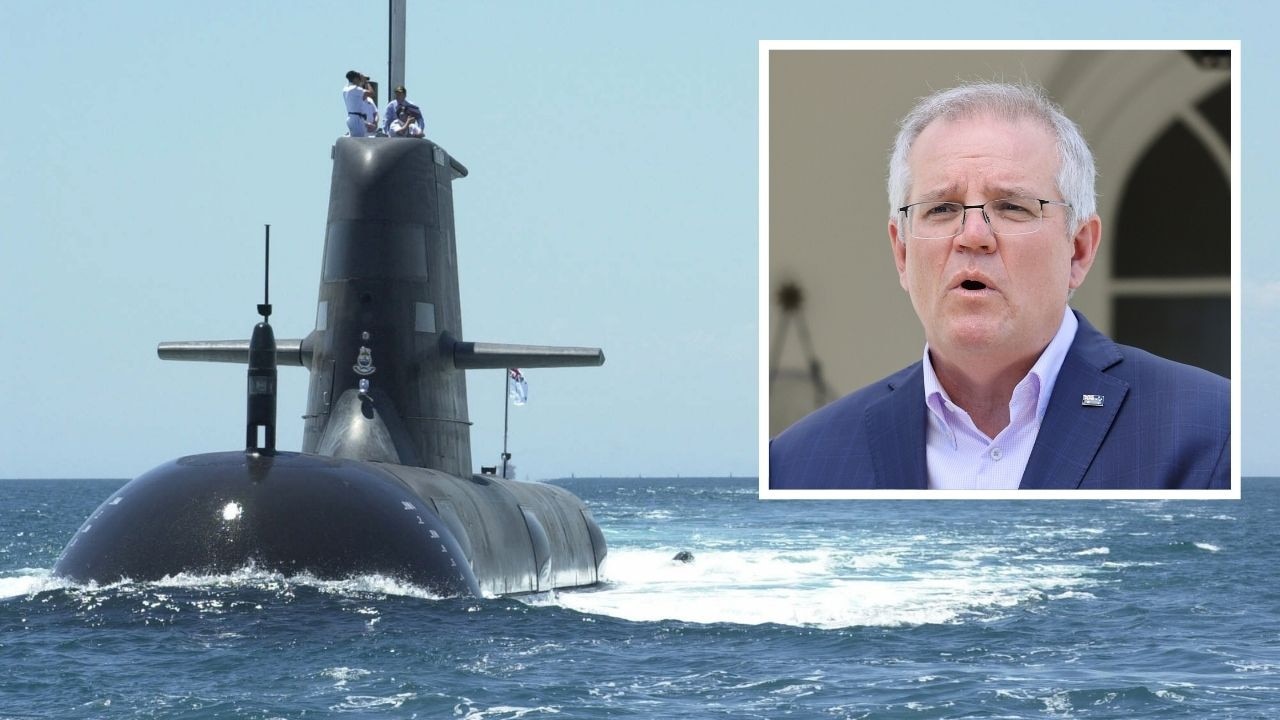Huge nuclear alliance ‘China’s worst nightmare’
Scott Morrison has announced a Australia’s submarine program will “go nuclear” under a new defence pact that could spell bad news for China.
Prime Minister Scott Morrison has announced a landmark deal with the US and UK for Australia’s submarine program to “go nuclear” under a defence pact that has been described as “China’s worst nightmare”.
The new grouping to be known as AUUKUS will advise Australia on how to identify the best way to acquire nuclear-powered submarine capability and share advanced technologies involving artificial intelligence.
The pact was announced on Thursday morning via a joint press conference with Mr Morrison, US President Joe Biden and UK Prime Minister Boris Johnson.
“Our world is becoming more complex, especially here in our region – the Indo-Pacific. This affects us all. The future of the Indo-Pacific will impact all our futures,” Mr Morrison.
“To meet these challenges, to help deliver the security and stability our region needs, we must
now take our partnership to a new level. A partnership that seeks to engage – not to exclude. To contribute, not take. And to enable and empower – not to control coerce.
“So AUUKUS is born, a new trilateral relationship between Australia, the United Kingdom and the United States. AUUKUS – a partnership where our technology, our scientists, our industry, our Defence Forces, are all working together to deliver a safer and more secure region that ultimately benefits all.”
Mr Morrison said the first major initiative of AUUKUS will be to deliver a nuclear powered submarine fleet for Australia, with the three nations working together over the next 18 months to determine “the best way forward to achieve this.”
The submarines will be built in Adelaide, in close co-operation with the United Kingdom and the United States.
However, Mr Morrison insisted that Australia was “not seeking to establish nuclear weapons or establish a civil nuclear capability” and will continue to meet all of it’s nuclear non-proliferation obligations.
Mr Biden said creating AUUKUS was a “historic step to deepen and formalise co-operation among all three of our nations.”
He said the aim of the agreement was to ensure long term peace and stability in the Indo-Pacific region.
“Because the future of each of our nation, and indeed, the world, depends on a free and open Indo-Pacific, enduring and flourishing in the decades ahead,” Mr Biden said.
“This is about investing in our greatest source of strength. Our alliances and updating them to better meet the threats of today and tomorrow.”
The UK Prime Minister said this agreement was opening a new chapter in the “friendship” between the three nations.
“This will be one of the most complex and technically demanding projects in the world,” Mr Johnson said.
“Lasting for decades and requiring the most advanced technology. It will draw on the expertise that the UK has acquired over generations dating back to the launch of the Royal Navy’s first nuclear submarine over 60 years ago.”
Senior ministers were rushing back to Canberra on Wednesday night for national security meetings ahead of the major announcement.
Labor leader Anthony Albanese and several Labor frontbenchers were also briefed with Defence Minister Peter Dutton and Foreign Affairs Minister Marise Payne, who are overseas, dialling in for the meetings.
Diplomatic and defence sources suggest it could involve operating US submarines out of Perth’s HMAS Stirling.
But there was also speculation that the British Government could be involved to support Australia secure the technology required to service nuclear submarines.
The proposal for Australia to tear up existing contracts for French subs and purchase US nuclear technology has previously been described as “China’s Worst Nightmare” in the region – which could “tip the military balance in Asia.”
In June, the Prime Minister held discussions with French President Emmanuel Macron over growing concerns regarding the $90 billion project that will not deliver submarines until 2030.
The Australian Naval Institute has recently been promoting the option as the best ‘Plan B’ for Australia’s troubled submarine program.
“With regional tensions increasing, then building our own one-off type submarines which will arrive in the early 2030s is not good enough. We have no guarantee they will work,’’ the article stated.
“When we built the Collins class submarines (at exorbitant expense) they did not work properly for several years. It is only now – after decades of operation – that they are reasonably functional.
“Submarines are the ultimate deterrent and attack weapon: their location is hopefully unknown, and they can strike at targets without warning. But we need to expand beyond the capabilities of the Collins, and also the French Attack boats which we should abandon.
“Instead we should buy 12 of a proven design which is already in the water. We want long-range hunter-killer vessels. We also want them to be able to stay submerged for long periods to avoid detection. Nuclear does this in spades.”
The Prime Minister is scheduled to fly to Washington next week for talks with the US President. He has recently been jetting between Sydney and Canberra for national security meetings that his office said could not be conducted remotely.
For all the latest Technology News Click Here

